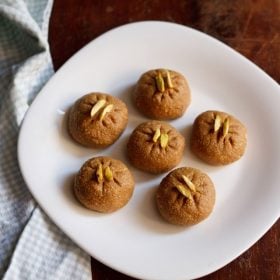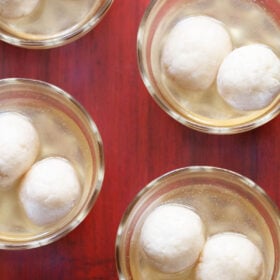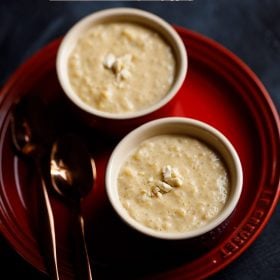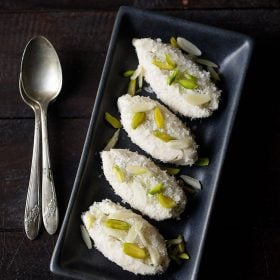
Mishti Doi, a cherished delicacy of Bengal, is a timeless yogurt treat crafted from milk, yogurt culture, and jaggery or sugar. Traditionally prepared in clay pots, it acquires a distinctive earthy taste. Incorporating the winter specialty, date palm jaggery or nolen gur, adds a rich brown color to the yogurt. I’ve included this special ingredient in my own Mishti Doi recipe. You shouldn’t overlook the opportunity to indulge in this delightful dessert – it offers a unique alternative to typical sweets.
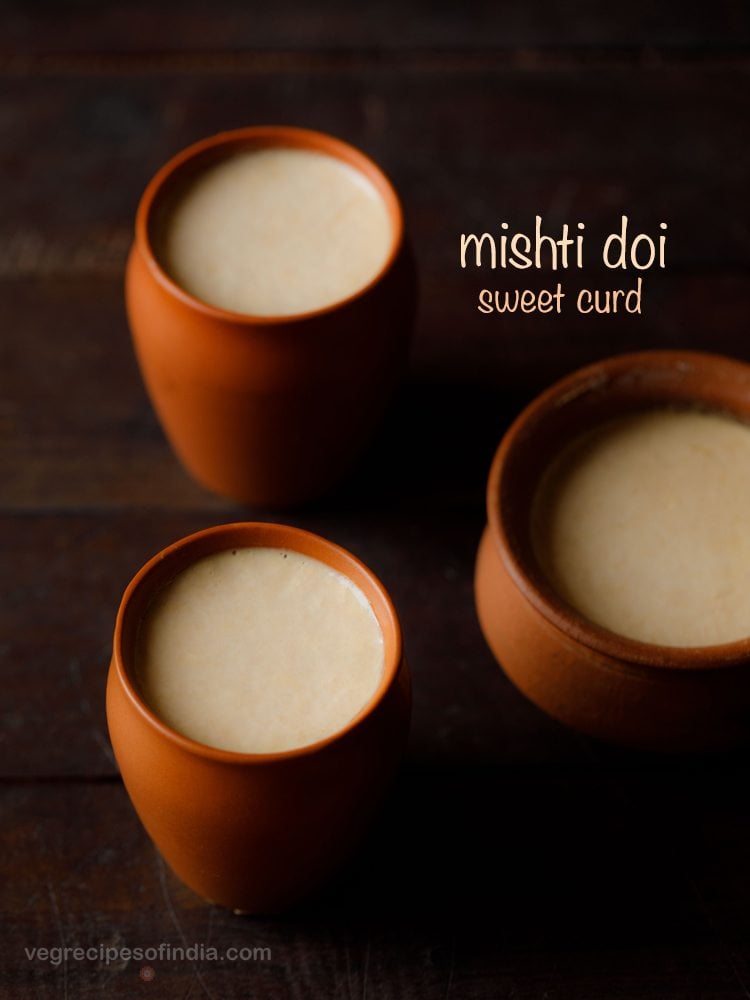

What is Mishti Doi
When we translate this Bengali name in English, it would simply mean:
Mishti – sweet
Doi – curd or yogurt
So, if you want to even translate Mishti Doi into Hindi, it would be called as Meetha Dahi.
I’ve heard about some stories relating to the origin of the Mishti Doi recipe. Before I go onto that, this curd variety is not just famous in West Bengal, but also is a popular dessert in the Bogra district of Bangladesh and other Indian states like Odisha, Assam and Tripura. The Assamese version may also be referred to as Meetha Doi.
Why earthenware is a preferred choice as the container to set the Mishti Doi? The answer to this is the porous walls of the earthenware help in perfect thickening of the yogurt as it gradually evaporates. Not just this, they also produce an apt temperature, which is an essential requirement for the growth of the culture. This also results in a typical taste, which is spectacular at all levels!
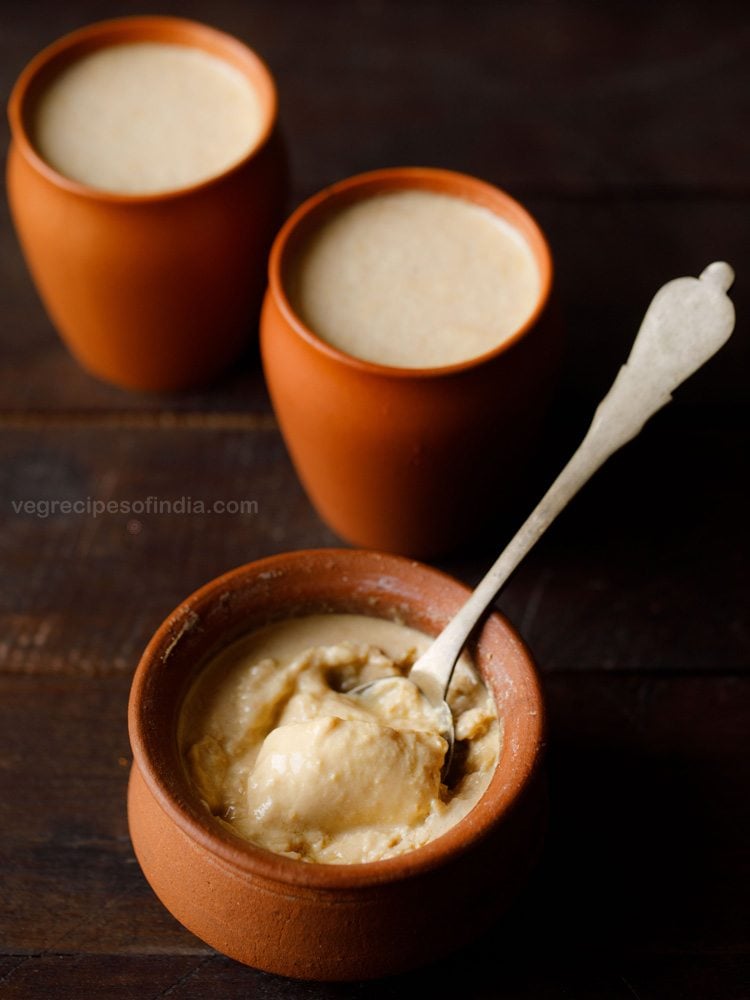

According to legends, a common belief amongst the locals in Bengal has been that, consuming Mishti Doi before any assignments taken would lead to successful results. This resonates with the other Indian belief of having dahi-shakkar (curd-sugar) before leaving from home to appear for any exam.
Till today, mothers feed their children a spoonful of sweetened curd, which is considered as auspicious. Scientifically, it keeps the body and mind cool to take on the pressure of examinations.
Also, while you’re going through this Mishti Doi recipe, I would suggest you to take a look at this recipe of How To Make Curd. So that from now on, you’re always consuming a batch of fresh homemade curd and also using it to make more of Curd Recipes.
About this recipe
Mishti Doi was and is one of my favorite Bengali desserts. Some 12 to 14 years back in Mumbai, on special occasions, I used to visit one particular Bengali sweet shop in Malad West in the western suburbs.
From there, I would purchase a variety of sweets or mishti as they are called in Bengali, and stock my refrigerator with them. The humble, yet delicious Mishti Doi would undeniably be one of the sweets that was a must in that list.
Making Mishti Doi is not the same as making your simple dahi or curd. The procedure is different. Firstly, you have to thicken and reduce the milk. Then, add the palm jaggery. Eventually, you’ll have to wait till the milk is warm, and then add the curd. Post this, you will have to keep the mixture for some hours to set completely.
For Mishti Doi recipe, it is best to use earthen bowls or pans. Why? As I said earlier, earthen bowls have permeable walls which help absorb the moisture from the doi, in turn making it nicely thick. I have shared many other Bengali sweets on the blog, which you must try.
You will not find any flavorings added to the original recipes of this well-known Bengali dessert. However, I feel some hints of cardamom powder impart a lovely aroma as well as flavor to the Mishti Doi.
Fermenting in the Mishti Doi recipe takes more time as compared to making curd. The timing also varies with the local temperature conditions. If you live in cold climate zones, then keep the curd in a warm place in your house. For example, near a heater or gas stove, or inside a lit oven.
Since an authentic recipe of Mishti Doi has date palm jaggery (nolen/khejur gur) in it, it is also primarily a winter delicacy and considered as a healthier dessert option than the rest. Nolen gur is iron-rich and the micro-nutrients in it help acting as immunity to the system against many infections. Consuming it also helps curbing cramped calf muscles and sore eyes.
Step-by-Step Guide
How to make Mishti Doi
Boiling milk
1. Take 1 liter full fat milk in a heavy kadai or pan. Keep the flame to low or medium-low and begin to heat milk.
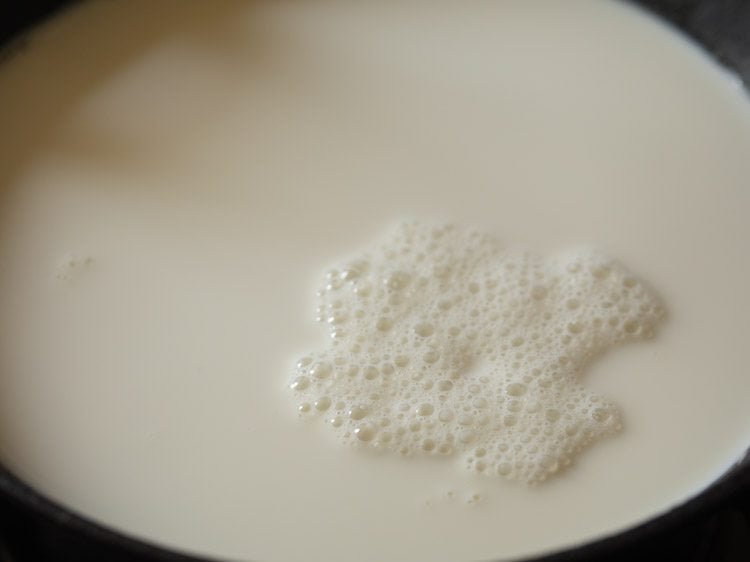

2. Stir occasionally while the milk is getting heated. Let the milk come to a boil.
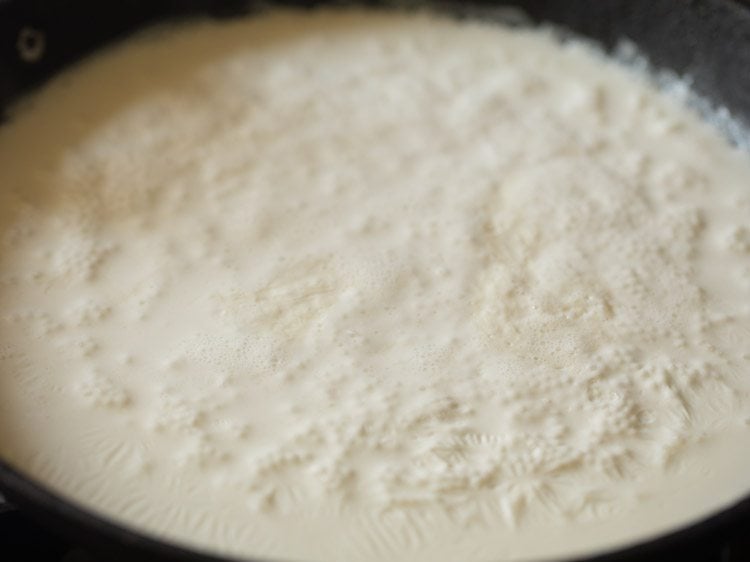

3. Then, continue to simmer the milk on low to medium-low heat. Stir often while the milk is getting simmered.
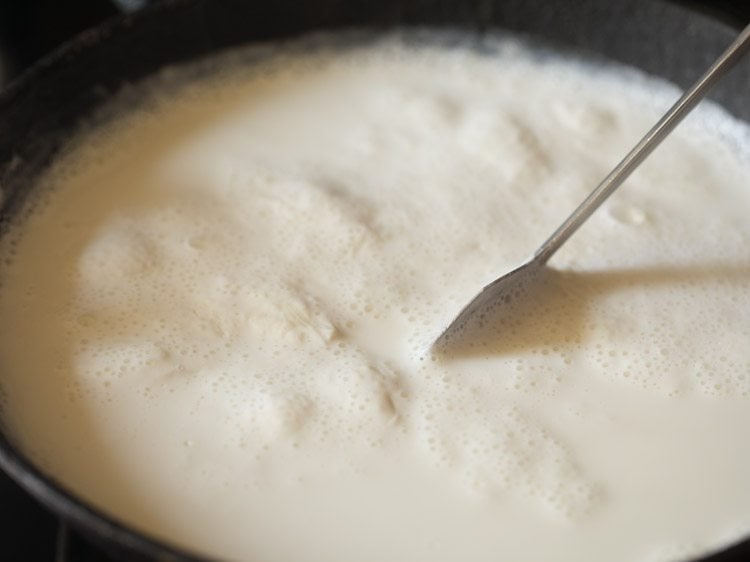

4. This continuous simmering will reduce the milk.
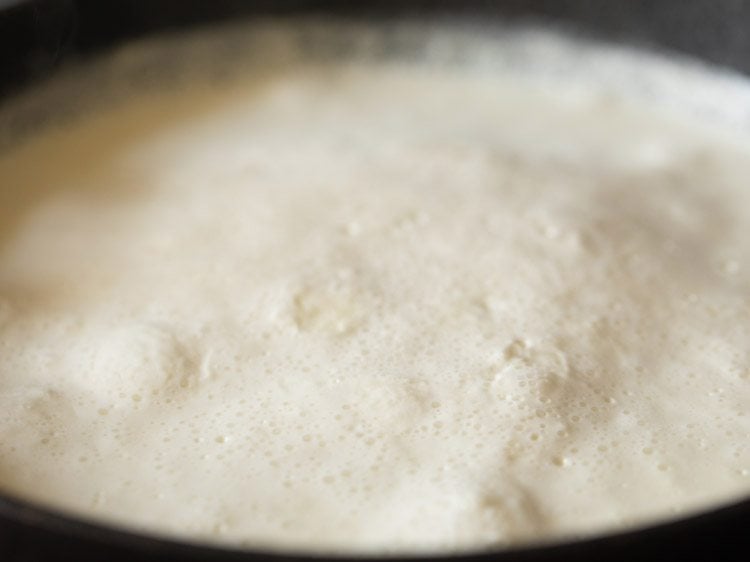

5. Stir often. Also, scrape the dried milk solids from the sides and add to the simmering milk.
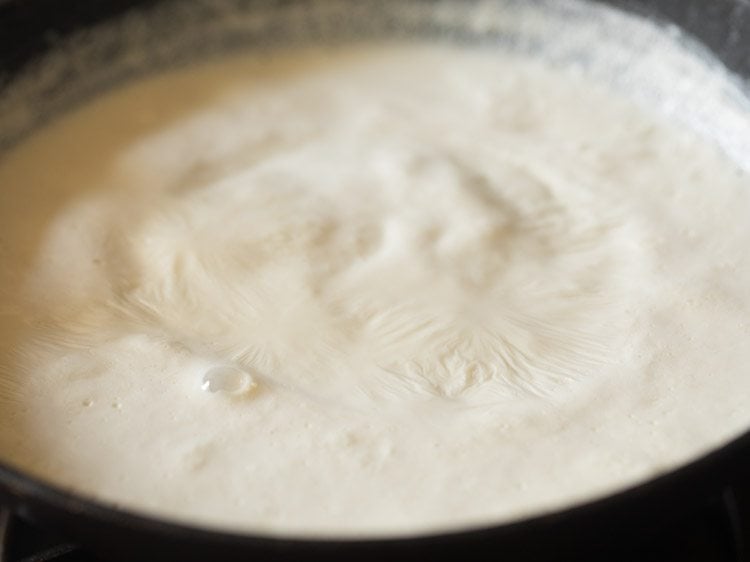

6. Simmer milk till it reduces to ⅓ or ½ of the original volume.
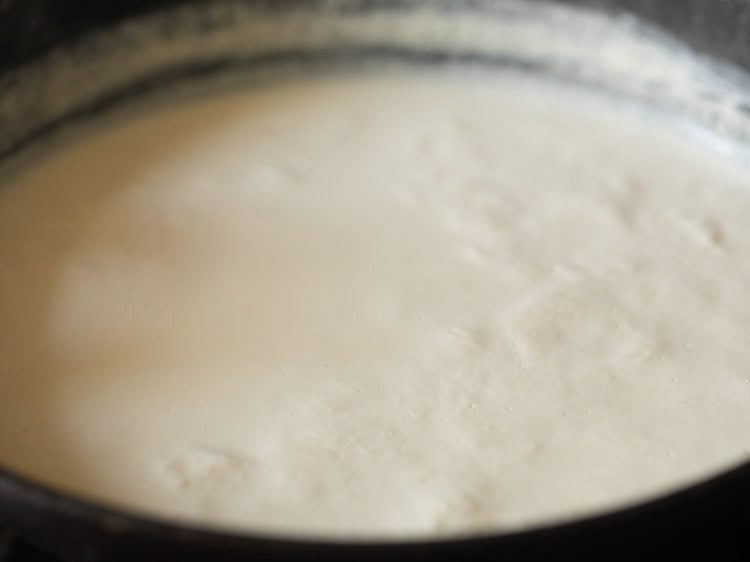

7. Remove the pan from heat and let the milk cool for about 8 to 9 minutes. Scrape the dried milk solids from the sides and add to the milk.
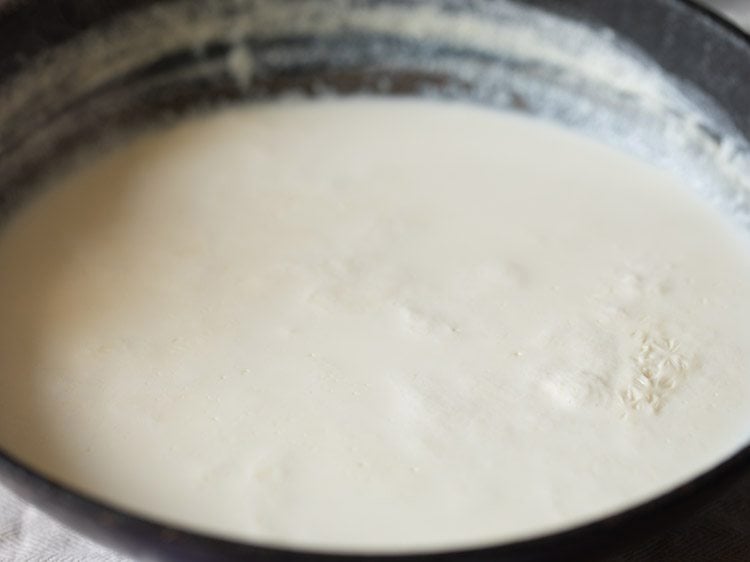

Making Mishti Doi
8. Meanwhile, finely chop or grate 175 to 180 grams palm jaggery. You will need ¾ cup finely chopped palm jaggery.
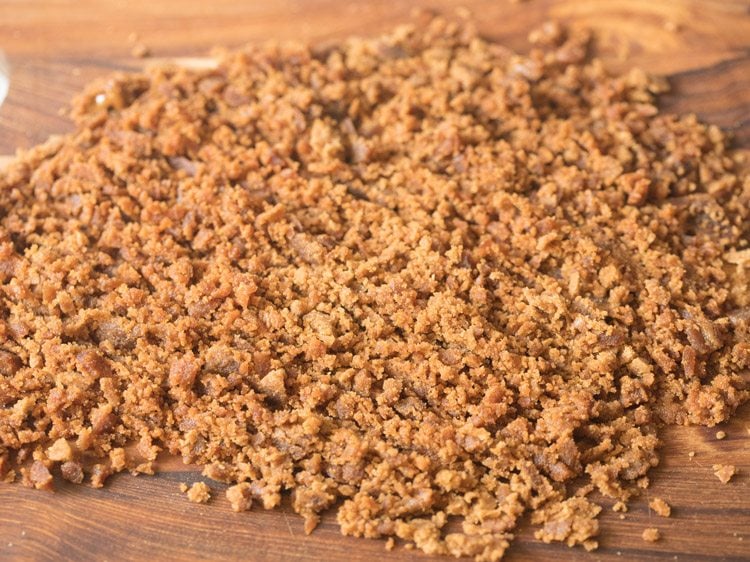

9. After 8 or 9 minutes, add the chopped palm jaggery to the milk. When adding jaggery, the temperature of milk can be 60 to 65 degrees C.
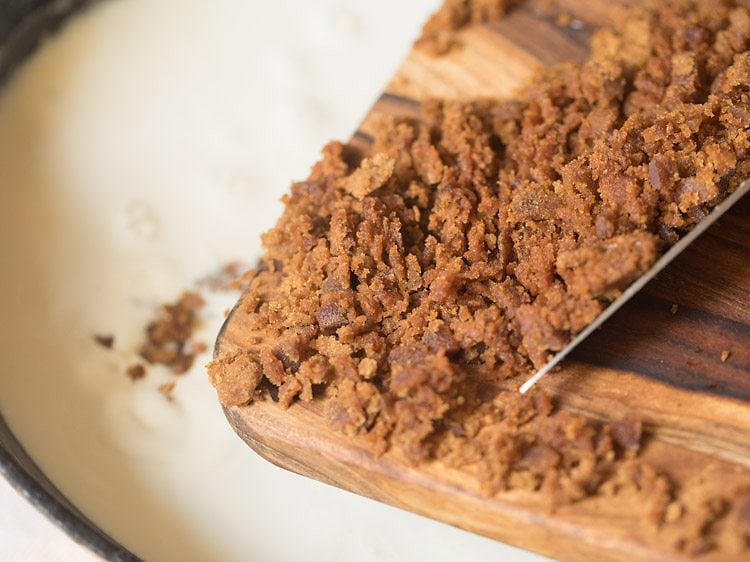

10. Mix very well till all the jaggery is dissolved.
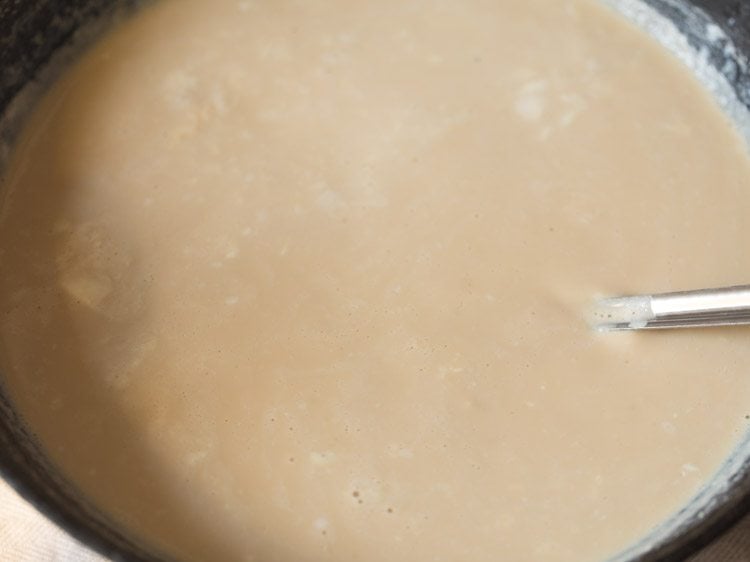

11. Add ½ teaspoon cardamom powder. Mix well and let the milk become warm. After adding jaggery, the temperature of milk will reduce. So, you can check the temperature after adding milk.
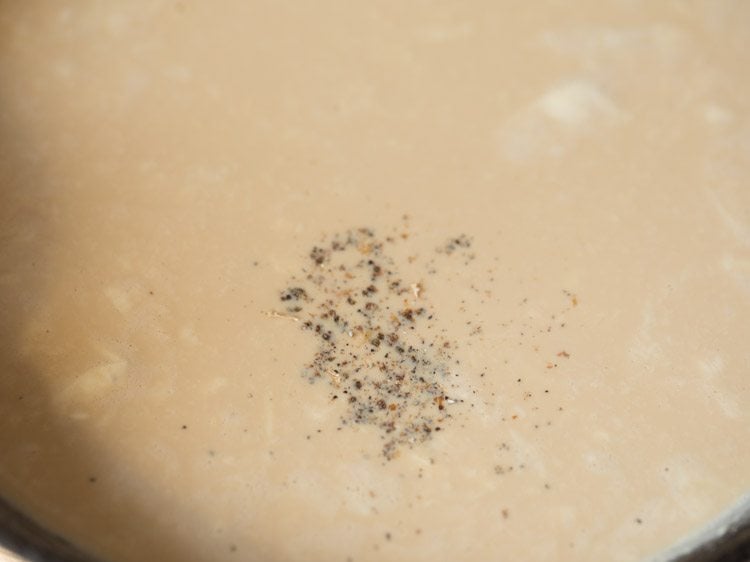

12. The milk should be warm – meaning if you dip your finger in the milk, your finger should feel comfortably warm, but not hot. If you have a cooking thermometer, you can check the temperature. It should be between 40 to 44 degrees C.
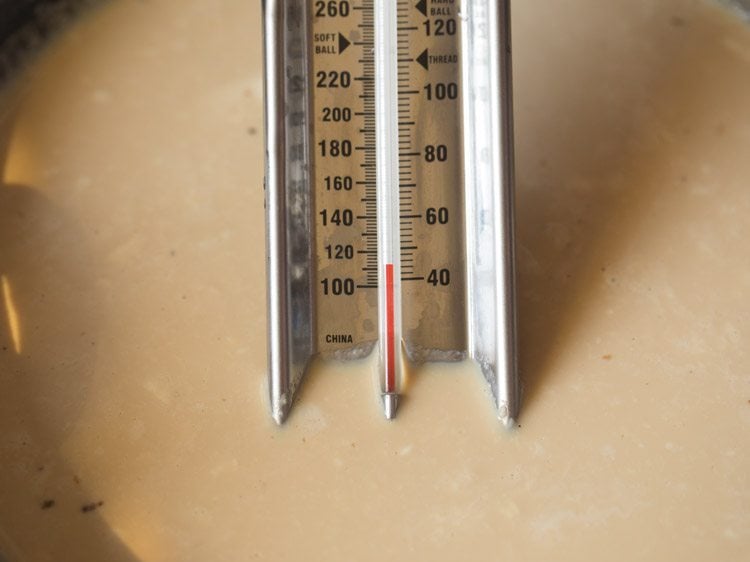

13. Now, add 2 tablespoons curd.
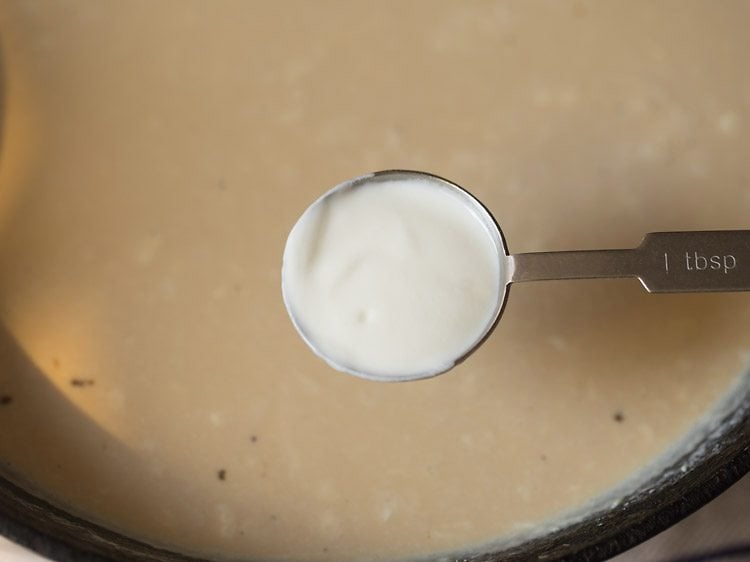

14. With a whisk, mix very well. The curd should dissolve in the milk. If you want you can even beat the curd before you add.
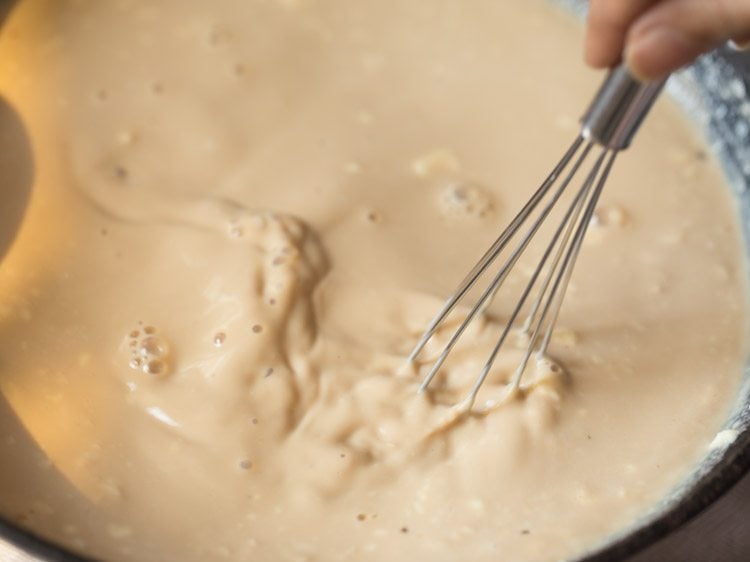

Setting Mishti Doi
15. Now, pour the curd mixture in earthen or terracotta bowls, or earthen handi.
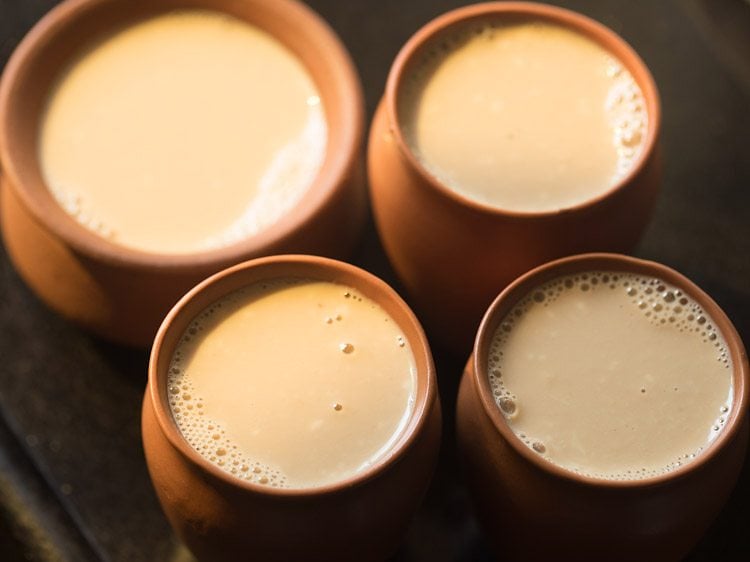

16. Cover with a lid or seal with aluminium foil.
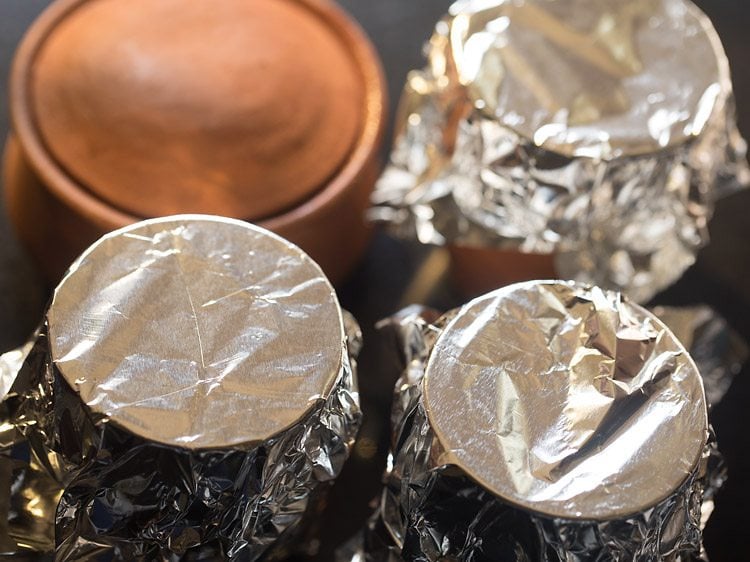

17. Keep in a warm place for the Mishti Doi to set. Mishti doi takes longer to set than curd. The timing will also vary with the temperature in your city. Since its cool and not hot where I live, it took 23 hours for the curd to set. So, you keep for 9 hours to 24 hours.
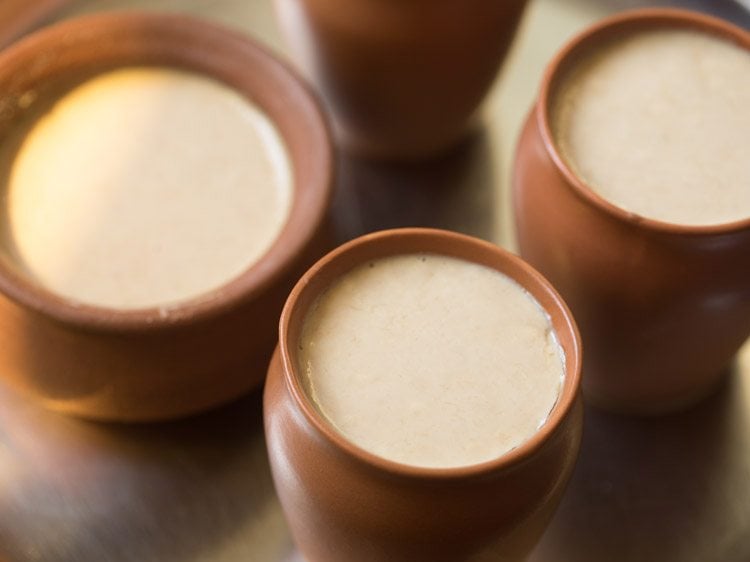

18. When set, refrigerate and serve Mishti Doi as a dessert after your meals.
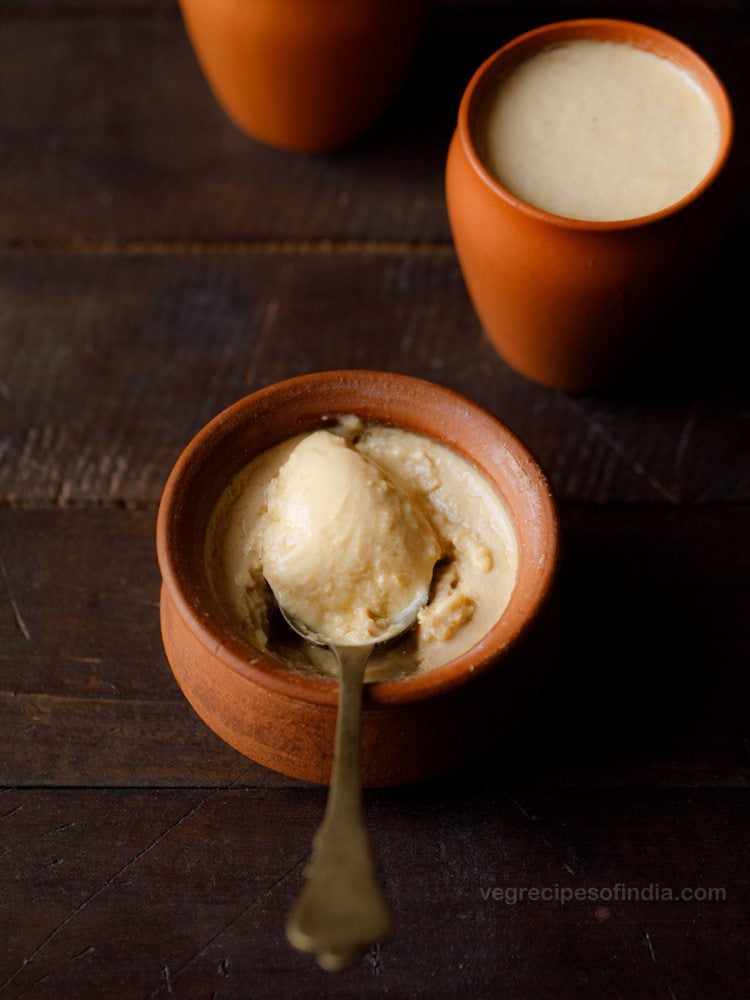

Mishti Doi: Origin
While it is obvious that most of us know Mishti Doi as the quintessential sweetened yogurt variety, hailing from Bengal and how Bengalis really take pride in this fermented dessert; it is also true that there are many stories that may be related to its origin.
As I also mentioned earlier, all you need for a Mishti Doi recipe is milk, palm jaggery/sugar and curd culture (sometimes flavorings like cardamom powder can also be added). However, to begin with, one story relates it to the times when curd came in light in Bulgaria.
According to food historians, back in those days, the local Bulgarian tribes used bags made of animal skin, put the curd in it and offered it to people with great power or authority. These bags used to help the curd ferment. This love of Bulgarians for yogurt travelled to other parts of the globe.
With the East India Company and the Britishers arriving in India, yogurt reached the Indian subcontinent. Here, the authentic Mishti Doi took birth in the Bogra district. From there, it spread to other states. It is also claimed that a certain Bose family of Sherpur district pioneered the Mishti Doi recipe.
Expert Tips
- Full fat cream is the best option to prepare Mishti Doi. Using other varieties or low-fat milk may result in curdling of the milk while making it.
- For a traditional look and flavor, I would suggest using date palm jaggery. If you don’t have it, you can use sugar as well.
- I have added cardamom powder as I like the subtle flavor of it in the curd. You can skip using it, if you wish to.
- Earthen or terracotta bowls/pots/handi should be preferably used to set the Mishti Doi.
- You have to keep the doi in a warm place to set. It will take longer time to set as compared to your regular curd. Th timing also varies with the temperature of your city.
More Bengali Sweet Recipes To Try!
Bengali Recipes
Sweets Recipes
Gluten Free Recipes
Bengali Recipes
Please be sure to rate the recipe in the recipe card or leave a comment below if you have made it. For more vegetarian inspirations, Sign Up for my emails or follow me on Instagram, Youtube, Facebook, Pinterest or Twitter.
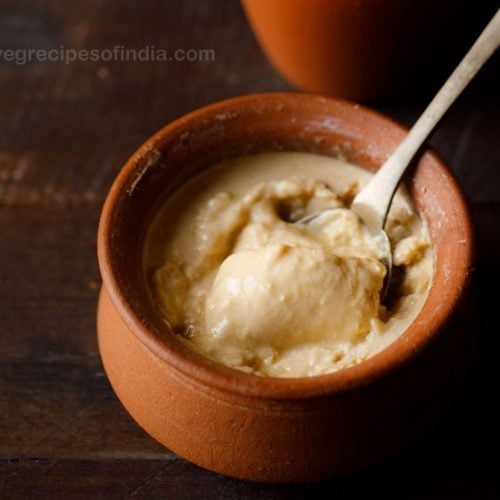

Mishti Doi
Mishti doi is a classic Bengali sweet made with milk, curd culture and jaggery or sugar. The jaggery used traditionally to make mishti doi is palm jaggery. In Bengali language ‘mishti’ means sweet and ‘doi’ is curd. In hindi language it can be called as meetha dahi.
Prep Time 5 minutes
Cook Time 30 minutes
Total Time 35 minutes
Prevent your screen from going dark while making the recipe
boiling milk
Take 1 litre full fat milk in a heavy kadai or pan. Keep flame to low or medium-low and begin to heat milk.
Stir occasionally when the milk is getting heated. Let the milk come to a boil.
Then continue to simmer the milk on a low to medium-low flame stirring often.
Scrape the dried milk solids from the sides and add to the simmering milk.
Simmer milk till it reduces to ⅓ or ½ of its original volume.
Keep the kadai down and let the milk cool for about 8 to 9 minutes.
making mishti doi
Meanwhile finely chop or grate 175 to 180 grams palm jaggery. You will need ¾ cup finely chopped palm jaggery.
After 8 or 9 minutes, add the chopped palm jaggery. When adding jaggery, the temperature of milk can be 60 to 65 degrees celsius.
Mix very well till all the jaggery is dissolved.
Add ½ teaspoon cardamom powder. Mix well and let the milk become warm.
Check the temperature of milk. It should be warm – meaning if you dip your finger in the milk, your finger should feel comfortably warm but not hot. If you have a cooking thermometer, you can check the temperature. It should be between 40 to 44 degrees celsius.
Now add 2 tablespoons curd.
With a whisk mix very well. The curd should dissolve in the milk. If you want you can even beat the curd before you add.
setting mishti doi
Now pour the doi mixture in earthen or terracotta bowls or earthen handi.
Cover with a lid or seal with aluminium foil.
Keep in a warm place for the mishti doi to set. Mishti doi takes longer to set than curd. the timing will also vary with the temperature in your city. So you can keep for 9 to 24 hours.
When it is set, then refrigerate. Serve mishti doi with your meals or as a dessert.
Nutrition Facts
Mishti Doi
Amount Per Serving
Calories 149
% Daily Value*
Cholesterol 1mg0%
Sodium 90mg4%
Potassium 15mg0%
Carbohydrates 38g13%
Sugar 29g32%
Calcium 12mg1%
* Percent Daily Values are based on a 2000 calorie diet.
This Mishti Doi recipe from the archives was first published in January 2018. It has been updated and republished in March 2024.

Source link
